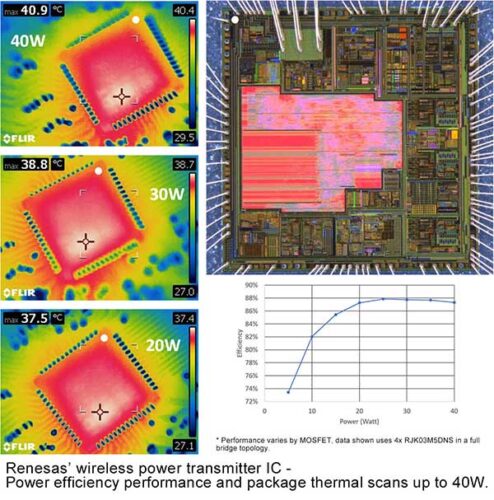 Renesas Electronics Corporation (TSE: 6723), a premier supplier of advanced semiconductor solutions, today announced that the company is presenting advancements of charging technology for mobile devices at the prestigious International Solid-State Circuits Conference (ISSCC) in San Francisco, February 19-23. During the conference, Renesas describes its single-chip wireless power transmitter solution that measures AC and DC transmitter power for improved accuracy and safety. The presentation also includes details of a transmitter technology with adaptive Zero-Voltage Switching (ZVS) that achieves reduced electromagnetic interference (EMI) and higher power transmission efficiency. These technical capabilities enable wireless power transmission up to 15W with a Qi power receiver (PRx) and up to 40W with proprietary PRx solutions.
Renesas Electronics Corporation (TSE: 6723), a premier supplier of advanced semiconductor solutions, today announced that the company is presenting advancements of charging technology for mobile devices at the prestigious International Solid-State Circuits Conference (ISSCC) in San Francisco, February 19-23. During the conference, Renesas describes its single-chip wireless power transmitter solution that measures AC and DC transmitter power for improved accuracy and safety. The presentation also includes details of a transmitter technology with adaptive Zero-Voltage Switching (ZVS) that achieves reduced electromagnetic interference (EMI) and higher power transmission efficiency. These technical capabilities enable wireless power transmission up to 15W with a Qi power receiver (PRx) and up to 40W with proprietary PRx solutions.
DC and AC Coil Current Sensing and Foreign Object Detection
Renesas is the first in the industry to develop single-chip transmitter (Tx) technology that can directly measure both DC and AC power transmission components. With this approach, transmitted power can be measured more accurately, providing a means to accurately detect a mismatch between the power transmitter (PTx) and the PRx power levels. Furthermore, DC and AC coil current sensing can detect if a small metal foreign object, such as a paper clip, is caught between the transmitter and receiver, which otherwise could cause the object to heat up and compromise safety. The transmitter is equipped with analog AC coil current sensors and supports up to four transmitter coils to increase the charging area, improving the end user’s charging experience.
Adaptive Zero-Voltage Switching and Low EMI
One of the key innovations to be described at the ISSCC presentation is adaptive ZVS, which ensures that the power MOSFETs switch after their drain-source voltage has dropped to 0V, reducing switching losses and increasing efficiency. Since this adaptive ZVS technology operates over wide load conditions, it is ideal for half-bridge inverters powering varying loads. Moreover, this ZVS technology reduces EMI by lowering the amount of energy that is converted into electromagnetic noise. When compared to the conventional methods, using ZVS decreases EMI by 4 decibel (dB) and can increase the PTx efficiency by 1.7% or more.
ZVS also helps extend the operational life of power systems in many applications such as automotive in-cabin chargers by auto-calibrating the initial threshold of the comparator. Additionally, the system has a highly programmable Pulse Width Modulation (PWM) generator, which controls the transmitter power delivery characteristics to ensure that the device being charged receives the right amount of power. This improves the accuracy and stability of the charging process and provides more control over the delivered power.
“With the integration of these innovative technologies, new wireless charging systems are expected to change the way portable devices are charged,” said Filippo Neri, Senior Manager of Electrical Engineering for Renesas’ Mobility Infrastructure and Industrial Power Division, who co-authored the paper. “For example, foreign object detection is a very important safety feature when charging devices wirelessly. We’re committed to developing these and other features to deliver fast and safe charging experiences to everyone.”
These technical enhancements have been applied to some of Renesas’ wireless power transmitter ICs that are available today. Renesas is the global leader in wireless power solutions including power receivers for smartphones and other applications, as well as power transmitters for charging pads and automotive in-car applications.
Visit renesas.com/wirelesspower to learn more about Renesas’ wireless power solutions.
Renesas Electronics Corporation


